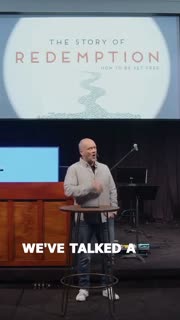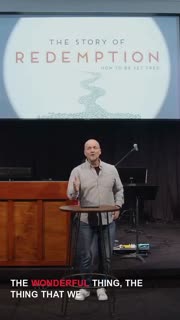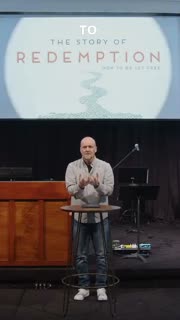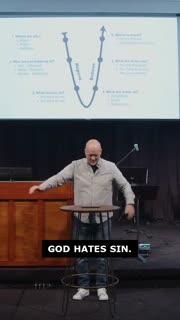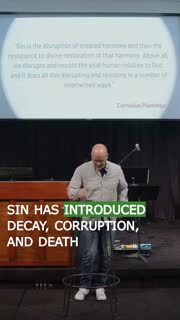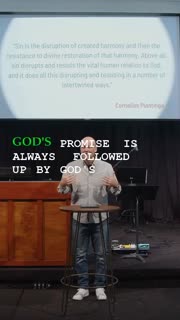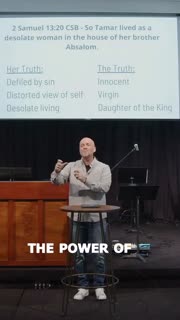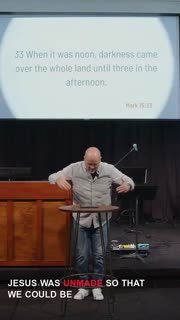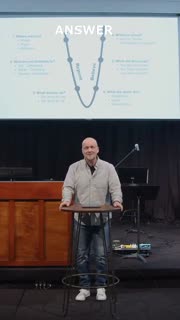God's Redemption: Overcoming Sin and Embracing Freedom
Devotional
Sermon Summary
Bible Study Guide
Sermon Clips
1. "We've talked a lot over the last year, and especially the last few weeks, of how there is intention in how God designed us to live within the world that we live in, that God created things with a purpose, with order, and with harmony, that he was intimately involved in bringing about a setting for our lives that we could flourish in. The Bible gives us a narrative around that that speaks to this longing inside of all of us that we know something is wrong, because as it was created to work, it stopped working. It broke. It broke when sin entered into the world. Sin is this three letter word that is incredibly powerful and offensive, right?" [31:15] (51 seconds)
2. "The wonderful thing, the thing that we just sang about is this awesome truth of God's faithfulness. So even Adam and Eve in their sin, hiding from God, he comes to them. He asks them three questions. Where are you? That's the first question. What is the answer? We're hiding. Why are you hiding? We were naked. Who told you you were naked? Is the second question. Who told you this? Right? Who told you you were naked? Did you eat from the tree? There's the third question. What did you do? What did you do? Now, God knew all of those things, right? But in his grace, he comes to them, asking them this question, to acknowledge what their needs to, in humility and honesty and vulnerability, confess that it's broken." [33:33] (54 seconds)
3. "To believe in Jesus is to be spiritually alive when we were once spiritually dead. And to know Christ in that kind of intimacy is to have that covenant restored, to begin to be made whole, to begin to be made renewed, to begin to be experienced redemption. That is freedom from the brokenness that exists within the world." [34:57] (24 seconds)
4. "God hates sin. He hates what it's done to the earth. He hates what it's done to humanity. God cannot excuse it, ignore it or forget it, because it would be a betrayal of his goodness. It would be a betrayal of his shalom. That is the peace, the harmony, the working of the world in his goodness. In fact, that's a way we want to understand sin. I've said in the past that sin is not a behavior to be managed. It's a power to be destroyed." [40:06] (32 seconds)
5. "Sin has introduced decay, corruption, and death into a world that was meant to be filled with life and flourishing. And I would ask anyone, anyone in this room or in society, if they have not experienced that, and I believe that they have, or they're living in total and utter denial. We see this played out in the exodus story in a very strange way, but a powerful way. God commits to setting his people free. He sees them living under this oppression by a man who thinks he is greater than God." [43:40] (38 seconds)
6. "God's promise is always followed up by God's power. And God brings his power in a demonstration of the vandalism of. Shalom. The breakdown, the undoing of creation. So over the next few weeks, this week, we're going to look at the plagues as the power of sin in our lives. In two weeks, we're going to look at God's response and judgment to sin. Today, what I want you to see is, is what sin is actually doing that we can see then in Christ how it's all restored." [44:46] (40 seconds)
7. "We can't deny the power of sin in us and in the world. We can't deny the power of sin. When people do things to us, whether it's on the one extreme of abuse or on the other stream of slander it distorts, it destroys how we view ourselves. God intervenes to show the people what has happened, but he doesn't leave them there. We're going to see how he sets them free ultimately by bringing about something that is going to break pharaoh and it's going to be a foreshadowing." [55:29] (39 seconds)
8. "Jesus was unmade so that we could be remade. Jesus was defiled so that we could be made whole. Jesus was destroyed so that we could be renewed. Jesus was put to death so that we could have resurrection from the dead. So then when I experience this brokenness, I listen to what is said about me. What does it say? It says this. Rise, be baptized, wash away your sins and call on his name." [59:19] (23 seconds)
9. "The answer to this is not good works. It's not being religious. A Christian is not someone who does good things and doesn't do bad things. A Christian is not someone who tries not to sin. A Christian is someone who believes that Jesus has given them everything they need for life and for godliness in him and that Jesus has done enough to set us free. I want to invite you to believe it for the first time or for the 1000th time. We will never ever stop needing this to be true." [01:03:02] (36 seconds)
Ask a question about this sermon
2. "The wonderful thing, the thing that we just sang about is this awesome truth of God's faithfulness. So even Adam and Eve in their sin, hiding from God, he comes to them. He asks them three questions. Where are you? That's the first question. What is the answer? We're hiding. Why are you hiding? We were naked. Who told you you were naked? Is the second question. Who told you this? Right? Who told you you were naked? Did you eat from the tree? There's the third question. What did you do? What did you do? Now, God knew all of those things, right? But in his grace, he comes to them, asking them this question, to acknowledge what their needs to, in humility and honesty and vulnerability, confess that it's broken." [33:33] (54 seconds)
3. "To believe in Jesus is to be spiritually alive when we were once spiritually dead. And to know Christ in that kind of intimacy is to have that covenant restored, to begin to be made whole, to begin to be made renewed, to begin to be experienced redemption. That is freedom from the brokenness that exists within the world." [34:57] (24 seconds)
4. "God hates sin. He hates what it's done to the earth. He hates what it's done to humanity. God cannot excuse it, ignore it or forget it, because it would be a betrayal of his goodness. It would be a betrayal of his shalom. That is the peace, the harmony, the working of the world in his goodness. In fact, that's a way we want to understand sin. I've said in the past that sin is not a behavior to be managed. It's a power to be destroyed." [40:06] (32 seconds)
5. "Sin has introduced decay, corruption, and death into a world that was meant to be filled with life and flourishing. And I would ask anyone, anyone in this room or in society, if they have not experienced that, and I believe that they have, or they're living in total and utter denial. We see this played out in the exodus story in a very strange way, but a powerful way. God commits to setting his people free. He sees them living under this oppression by a man who thinks he is greater than God." [43:40] (38 seconds)
6. "God's promise is always followed up by God's power. And God brings his power in a demonstration of the vandalism of. Shalom. The breakdown, the undoing of creation. So over the next few weeks, this week, we're going to look at the plagues as the power of sin in our lives. In two weeks, we're going to look at God's response and judgment to sin. Today, what I want you to see is, is what sin is actually doing that we can see then in Christ how it's all restored." [44:46] (40 seconds)
7. "We can't deny the power of sin in us and in the world. We can't deny the power of sin. When people do things to us, whether it's on the one extreme of abuse or on the other stream of slander it distorts, it destroys how we view ourselves. God intervenes to show the people what has happened, but he doesn't leave them there. We're going to see how he sets them free ultimately by bringing about something that is going to break pharaoh and it's going to be a foreshadowing." [55:29] (39 seconds)
8. "Jesus was unmade so that we could be remade. Jesus was defiled so that we could be made whole. Jesus was destroyed so that we could be renewed. Jesus was put to death so that we could have resurrection from the dead. So then when I experience this brokenness, I listen to what is said about me. What does it say? It says this. Rise, be baptized, wash away your sins and call on his name." [59:19] (23 seconds)
9. "The answer to this is not good works. It's not being religious. A Christian is not someone who does good things and doesn't do bad things. A Christian is not someone who tries not to sin. A Christian is someone who believes that Jesus has given them everything they need for life and for godliness in him and that Jesus has done enough to set us free. I want to invite you to believe it for the first time or for the 1000th time. We will never ever stop needing this to be true." [01:03:02] (36 seconds)
